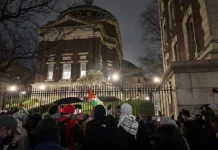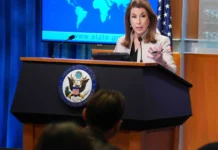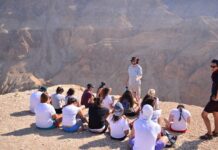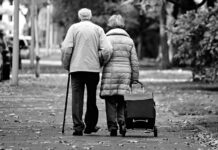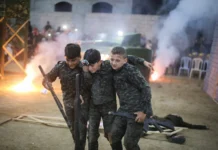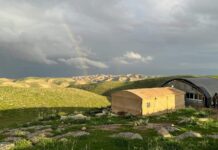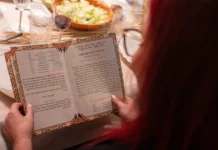Some areas are still not accessible, others were relatively spared
As first light dawned across Florida on Monday, people began venturing out to evaluate the damage left in the wake of Irma, one of the most powerful Atlantic hurricanes on record.
Large swaths of Florida have been battered by Hurricane Irma’s 120-plus-mph winds, which pounded the state for hours on end, and rainfall totals that could be measured in feet. More than two dozen people were killed in the storm when it roared through the Caribbean before setting its sights on Miami and cities northwards, and then surprisingly turning west towards Naples and up that coast.
The storm made landfall around 9 a.m. on Sunday morning in the Florida Keys, and as of Monday morning, Rabbi Yaakov Zucker, co-director of Chabad Jewish Center of the Florida Keys with his wife, Chanie, still wasn’t able to reach those members of his community in Key West who hadn’t evacuated.
“I was in touch with my guys in Key West until the middle of the storm—I guess it was until about 10 a.m.—and then the back side of it came through, and everything went down,” he said from Coconut Creek, Fla., where he evacuated with his family. “There’s almost no communications at all right now. I know two families with little kids in my community who stayed in their homes, and there were two guys in a house by the canal that almost flooded during Hurricane Wilma.
“It’s frustrating not knowing what’s going on,” he said. “People are calling me and saying, ‘Rabbi, what should we do?’ Rosh Hashanah is next week, and I don’t know what to tell them. I’m trying to get back to the keys ASAP so I can assess the damage, check on the people who are still there, see what they need, come back here, and get the supplies to return and help them.”
A private individual has offered Zucker the use of a helicopter to take him and his wife to Key West to assess the damage and return with supplies as soon as they get permission from the authorities to land.
According to Sam Kaufman, a city commissioner for Key West and a member of the Chabad Jewish Center, “like everybody, I am anxious to get back, but there’s no water. There are many leaks in the water line from the mainland to Key West. There’s no sewer, no hospitals, and no way we can safely return. We know there is a lot of damage in the area, and I’m worried. I don’t know if the trees fell down around my house, if my roof is still up. I’ve heard the flooding hasn’t been as bad as Hurricane Wilma, so that gives us some hope that we didn’t get water in our house, but that doesn’t mean others didn’t get some in theirs.”
Kaufman, whose home sits across the street from the Chabad House, credits a WhatsApp group created by Rabbi Zucker with helping keep the Jewish community in touch, even though they’re not physically in the same space—or even the same city, state or country. (A number of the people on the group are Israelis who come to Key West for work.)
“Our Jewish community is very tight-knit, and the WhatsApp group is really helpful for communication,” said the city commissioner. “I’ve actually gotten some good information, including some pictures of what’s going on down there.”
Coordinating Relief Efforts
Chabad emissaries throughout Florida have banded together to help coordinate relief efforts to people without power and to the homebound.
“First, we are trying to use all of our resources to create a system of communication, and be helpful to people who are out of town and who can’t reach a family member. They can call the local Chabad, and we’ll send someone to check on them,” explained Rabbi Mendy Gutnick, co-director of Chabad of West Parkland.
He noted that statewide, they have already fielded several hundred calls.
Additionally, he says, more than 42 Chabad Houses with electricity are opening their doors to congregants and neighbors, offering them a place to cool off, charge their cell phones and get a fresh meal.
“There are 7 million people still without power in this South Florida heat. Anyone with kids or elderly family members need a safe, cool environment to go to,” said Gutnick, whose own home has power. He has been hosting more than 60 people there this afternoon.
For those who need a meal but cannot physically get out, a number of Chabad emissaries will be delivering food. They include Rabbi Yossi Goldblatt, co-director of Chabad of Deerfield Beach, who will deliver some 75 meals to elderly residents at the city’s Century Village retirement center in Broward County.
Cleanup Begins in Flooded Miami
In the Brickell area of Miami—the city’s financial district, filled with high-rise buildings and right next to Biscayne Bay—where video clips on Sunday showed the water rushing down streets as if they were rivers, the waters had receded and cleanup is underway.
At The Shul of Downtown in the center of that area, “there was a lot of flooding on the ground floor, and in the elevator and elevator shaft,” reported Rabbi Chaim Lipskar, co-director with his wife, Deenie. “Our rooftop was damaged. All of our outdoor stuff there—our sukkah, our fans, our playground areas—were damaged.”
“It’s not terrible,” he said. “It could have been a lot worse. All around the street is blocked by fallen trees. You can barely drive around the area.”
In the nearby community of Sunny Isles Beach, Chanie Kaller, co-director of the Chabad Russian Center of South Florida said the first survey of the damage was “like Noah coming out of the teva[ark],” adding that “we fared pretty well. Our power was out all day yesterday, and we are quite ready to venture out and check out our school property.”
Kaller also planned on seeing to an elderly neighbor that she and her 10-year-old daughter, Nata, delivered food to on Thursday while in the midst of storm preparations. They have not talked to her since the hurricane began.
Storm Defied Forecasters’ Predictions
Irma, which remained a Category 5 storm for days while tearing a path of destruction throughout the Caribbean, defied forecasters’ predictions when it landed in Florida. After battering the Keys, it passed Miami, and shifted west and then slightly north, resulting in record flooding in Orlando and Jacksonville.
“The winds are still blowing hard; they were howling all night, and massive trees were snapping like twigs,” said Rabbi Shmuel Novack, co-director of Chabad of the Southside in Jacksonville, in the northern part of the state, with his wife, Chana. “Much of the city is without power. We are constantly in touch with students and community members, but conditions are still unsafe to leave home or shelters.”
He added that their focus now is “to make sure everyone is safe, and to help provide water, food and care to those in need as soon as the storm subsides.”
Also on hold is Rabbi Yosef Konikov, director of Chabad of South Orlando. His wife, Chani, runs the Hebrew school.
“We are waiting to be able to go to our Chabad center to see if there is power there, and if it can be a base for our relief and recovery efforts,” he said. “We have volunteers who are ready to go, so we can begin to help people the second we get out.”
He expects that volunteers will be primarily involved in checking in on the elderly, delivering fresh kosher meals and helping people clear away fallen trees from driveways.
“There are retirement communities where people are less tech-savvy,” said the rabbi. “We plan to drive over there with teams of people ready to help them clear out, as well as with warm food for anyone who needs it.”
By: Faygie Levy Holt
(Chabad.org)

